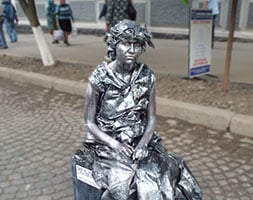 Immobile is an adjective from the Latin word immobĭlis that refers to one or that which has no movement . What is fixed, firm or still , therefore, is immobile.
Immobile is an adjective from the Latin word immobĭlis that refers to one or that which has no movement . What is fixed, firm or still , therefore, is immobile.
For example: “After receiving the electric shock and falling to the ground, the man remained motionless for a few seconds and then began to move,” “With a strong left foot kick, the Swiss striker left the goalkeeper motionless and scored the first goal of the match,” “ When I heard the news , I froze and couldn't react."
To classify something as immobile, it had to have movement before or there must be the possibility of it having movement in the future. Inanimate objects such as a table , a sculpture or a house, to name a few, will never move by themselves, so it makes no sense to clarify that they are immobile.
People and animals, on the other hand, perform a wide variety of movements, even unconscious ones, and have the capacity for locomotion. In fact, when breathing, a living being moves. In this way, when someone remains very still , it can be said that they appear immobile, even if they make small movements that are difficult to perceive.
An individual who falls unconscious, in this framework, remains immobile. In a figurative sense, someone who is paralyzed by shock or emotion also appears immobile.
Suppose a young man is walking down the street when he suddenly sees his wife kissing a stranger on a park bench. The boy, stunned by the scene, remains motionless for a few moments , trying to process and understand what he is seeing. When he manages to react, he decides to come and ask for an explanation.
Precisely, news or images that are extremely shocking to us can cause us to go into a state of paralysis that lasts a few seconds because we don't know what to do. One of the explanations is that we do not usually prepare for these types of situations, which are generally negative, and then it is difficult for us to process them since we feel like a child hearing for the first time a word that is very difficult to pronounce.
In this framework, it is also possible to speak of immobility in a symbolic sense to refer specifically to the impossibility of reacting on an intellectual or emotional level. Beyond being able or not to move our body in the face of a shocking situation, the apparent "freezing" that goes through our mind prevents us from reasoning what is happening.
 Similarly, the concept of immobility can be used to symbolize the lack of action or commitment that a person exhibits in the face of a given problem. Remaining immobile in the face of another's problem can mean refusing to help others, regardless of the reasons that cause this lack of action.
Similarly, the concept of immobility can be used to symbolize the lack of action or commitment that a person exhibits in the face of a given problem. Remaining immobile in the face of another's problem can mean refusing to help others, regardless of the reasons that cause this lack of action.
The adjective immobile is very common in everyday speech. However, there are various synonyms, some of which appear more frequently and allow us to appreciate certain nuances of their meaning that may not be so apparent to the naked eye. Let's look at some of the most notable ones below: stable, fixed, stationary, permanent, unalterable, invariable, immoveable, inert, constant , firm and immovable .
In the previous list we can notice some terms that serve especially to refer to the absence of physical movement and others, such as being immovable or unalterable , that are suitable for the meaning focused on reason and feelings. People who keep their sensitivity blocked generally fear the outside, but the perception that others usually have of them is that they do not want to get involved because they are not interested in other people's problems.
Finally, we can mention some antonyms of immobile , such as being unstable, variable , mobile, alterable and changing . All of them denote constant movement, absence of stability, an unpredictable nature.
